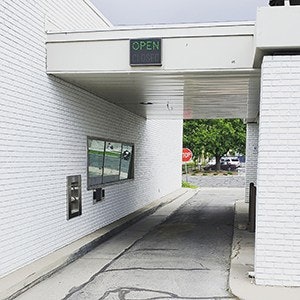
Narith Panh has long advocated for the use of cannabis as part of a healthy, holistic lifestyle.
When he was just 22 years old, Panh was diagnosed with a bulging disc, which caused him to suffer chronic back pain that made him rely on prescription pills and other remedies with unwanted side effects. With two options—undergo surgery to get his discs fused or deal with the pain—Panh chose the latter of the two, turning to a healthy, holistic lifestyle, including yoga and cannabis, to manage his chronic pain.
A native Utahn, Panh moved to California for five years, where he learned about the cannabis industry while working in research and consulting for Fortune 500 companies like Google, Uber, Volkswagen and Honda, helping them with brand strategy and product development.
Then, last year, Panh had a life-changing moment that inspired him to fully immerse himself in the cannabis industry.
“My little brother was walking across the street one night and he was struck by a drunk driver at 45 mph,” Panh says. “We should’ve lost him. Our family is really fortunate that he survived the accident.”
Utah has been hard hit by the opioid epidemic, he adds, and after seeing friends and family members affected by opioid addiction, Panh wanted a different outcome for his brother.
“The second we got out of the hospital, I called a friend in California and had them send me a care package, and through his entire eight-month recovery process, we 100% medicated him with medical cannabis—not a single pain pill through that entire process,” Panh says. “If it wasn’t for medical cannabis, my brother would be in a far different situation and outcome than he is today.”
Many families do not have the same education and awareness regarding medical cannabis, he adds, and this path is simply not an option for them.
“That’s what really set me on my journey for medical cannabis,” Panh says. “I was really looking to help other people, to get them access, and that’s how I got connected with Dragonfly.”
First Movers on a Mission
Panh joined Dragonfly Wellness, a vertically integrated medical cannabis operator based in Salt Lake City, Utah, as the company’s chief strategy officer in January 2020.
Panh’s family settled in Utah as Cambodian refugees in 1980, and it is the only home he has ever known. He was immediately impressed with Dragonfly’s commitment to the local community.
“They are really invested in empowering the industry, creating new community outreach programs, investing in the community and helping our local community because they’re refugees just like me,” Panh says.
Dragonfly’s mission is to empower patients to take control of how they manage their health, and as the first medical cannabis pharmacy to open its doors in the state, the team hopes to set the standard of what it means to provide medical cannabis to the state’s patients.
“We see ourselves as community advocates and pioneers in the space for social justice, social equity, bringing control back into the patients’ hands and taking it out of big industry,” Panh says.

The company secured three separate licenses to cultivate, process and sell medical cannabis in Utah, and is one of only three vertically integrated operators in the state. Dragonfly’s medical cannabis pharmacy opened March 2, the first official day that Utah launched sales.
Panh praises the state for the rollout of its medical cannabis program, which was approved by voters in November 2018 and finetuned by lawmakers in January 2019.
“It’s been pretty incredible to take a step back and see how much has been accomplished,” Panh says.
Growing Pains
Like any emerging market, Utah’s cannabis industry has had its fair share of challenges.
When Dragonfly opened its doors in March, there were only 17 patients enrolled in the state’s medical cannabis program, Panh says. The day after the pharmacy opened, it served only one patient.
“The first month in March was pretty abysmal,” he says. “We probably averaged 10 patients a day, and there was a huge backlog because patients had challenges applying for their medical cannabis cards through the state’s system.”
The program also lacked certified doctors who were able to recommend medical cannabis to patients, Panh adds, estimating that there were less than 20 qualified medical providers (QMPs) in the entire state who could certify patients for the program when it opened.
“[If] you don’t have doctors writing letters, you don’t have patients with cards,” Panh says. “If you don’t have patients with cards, you don’t have business as a pharmacy. So, there were some challenges.”
The market is quickly maturing, however, and Dragonfly now serves an average of 200 patients per day and there are over 300 QMPs across the state. On 4/20, the pharmacy had a six-hour wait for patients to come in and purchase their products.
Two other medical cannabis pharmacies have opened in the past few weeks, Panh says, although Dragonfly remains the only storefront in Salt Lake County, which houses the majority of Utah’s population.
Being vertically integrated, Dragonfly can produce its own products for sale in its pharmacy, but operational challenges in the early days of the market prevented the company from growing at full capacity.
“We could only operate one grow room for the first six months of operation because Rocky Mountain Power couldn’t get service to our building to get our seven other grow rooms up,” Panh says. “We are fully operational now, but it was a slow rollout at the beginning. We certainly couldn’t supply the entire state with one grow room.”
There are eight licensed cultivators in Utah, but with some licenses issued as late as June of last year, many growers are not yet up and running at full volume, Panh says.
Another challenge, he adds, is managing patient expectations. Many of Dragonfly’s customers are accustomed to purchasing product from the illicit market or neighboring states such as Nevada and Colorado, which have much more mature markets and a wider selection of products.
“Then they come to Dragonfly Wellness, which has been open for three months in Utah, and all we have is flower, vape carts, topicals and tinctures, and we’re constantly out of stock every single day,” Panh says. “If you’re a medical patient and you’re expecting a pharmacy to provide for your medical needs and every time you go in there, they don’t have any product, you’re going to be pretty frustrated. We understand that frustration, so part of the challenge is, how do we educate patients and tell them, please be patient with us because the program just opened?”
For the most part, however, Dragonfly has been met with gratitude from patients who are finding relief in the state’s regulated medical cannabis market.
“It really shows me that I’m doing this for the right reasons,” Panh says. “It’s truly for those families that are suffering, that had to hide in the shadows, that have not been treated with respect and dignity in terms of the law, that have been treated as less and second-class citizens. For all those families, that’s why we’re here, and to get that response from patients makes it worth what we’re doing.”
And, from a business perspective, Panh expects the bumps in the road and growing pains as Utah’s market finds its footing.
“I don’t know any cannabis industry in any state that didn’t have the same growing pains that we did,” he says.
Ongoing Goals and Optimism
Overall, Panh is amazed at the progress Dragonfly has made since opening its doors in March.
“We opened up with not even a full pharmacy built out,” he says. “We had temporary cabinets in, and now, we’ve got a drive-thru service, online ordering [and] hundreds of patients a day. It’s a night-and-day difference from where we were just three months ago. I’m so proud of the state of Utah, [and] how hard the Department of Health and the Department of Ag is working.”

Regulators have largely been receptive of industry feedback on the program, Panh says. “Any complaints we have, they’re so open to listening because they know the rules and regulations that were made aren’t perfect and they were made by people who don’t understand medical cannabis. … When we have an issue and we want to make a change, they actually find ways to make it work. They have been an incredible partner in this. They want the program to succeed.”
Looking ahead, the Dragonfly team strives to be a market leader in Utah as one of the only locally owned and locally operated vertically integrated companies in the state.
“That allows us to set the bar for when other out-of-state companies come in on what type of service you should be providing to your patients,” Panh says.
And Dragonfly is prioritizing patients over profits, he adds. “We went into this business, into the pharmacy side, knowing that we’re only going to make 5%. That’s just enough for us to cover our costs [and] have a little bit of money in case there’s an economic downturn or we run into issues, but we wanted to be able to set the pricing so when other people come in, they don’t take opportunistic pricing because of supply and demand and gouge our patients. Being a first mover was really important to us because we wanted to maintain control of our home and our Utah market.”
Dragonfly offers patients in-store and virtual consultations with its wellness associates, who go through the same training process that the state requires for medical professionals and pharmacists.
Ultimately, the company wants to expand beyond Utah to be a nationwide—and even a global—brand.
“Our true belief is that cannabis has the opportunity to heal the world in so many different ways and tackle so many of the different health issues that we have,” Panh says. “[Our] long-term goals are really focused on making a positive impact in our world.”
This includes being a voice for social justice and social equity, he adds. As a minority-owned company, Dragonfly is committed to advocating for a more diverse cannabis industry in Utah, although no social equity guidelines were outlined in the state’s current medical cannabis law.
Regulators have already awarded all the business licenses that they planned to issue at the onset of the market, but the Department of Health can license more businesses based on need as the market matures.
“You can be sure that we’ll [be] a pretty big voice so when they do issue new licenses, we will absolutely demand that those licenses at least be considered for … minority-owned businesses,” Panh says.
























